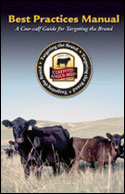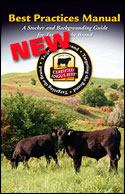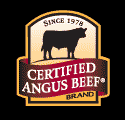Is Your Herd at Risk for Trich?
Here's a short test to asses your herd's risk of being infected with trichomoniasis.
Do you feel like you're in the dark on whether your herd could be at risk for the devastating reproductive disease trichomoniasis? Take our self-assessment to identify if your herd is at risk. Simply answer 'yes' or 'no' to the following six questions:
- 1. Has trichomoniasis been diagnosed in your area?
- 2. Do you utilize open-range grazing?
- 3. Do you purchase mature bulls for breeding purposes?
- 4. Are breeding bulls purchased for your herd without knowledge of their health status?
- 5. Is an extended breeding season used?
- 6. Do you vaccinate for trichomoniasis?
If you answered 'yes' to any of one through five, or 'no' to question six, your herd is currently in danger of contracting trichomoniasis. According to Boehringer Ingelheim Vetmedica Inc. (BIVI) Professional Services Veterinarian Travis Van Anne, here's why you should be concerned.
Q: Has trichomoniasis been diagnosed in your area?
"Because no fence is cattle-proof and cattle movement from farm to farm occurs, detection of trichomoniasis in your region is a serious issue. Oftentimes, the venereal disease is spread to new herds when infected bulls or cows travel across pasture borders or are sold regionally. The disease is then introduced through sexual contact."
Q: Do you utilize open-range grazing?
"While open-range grazing may be an excellent asset of herds in your area, it increases the risk of unknowingly contracting trichomoniasis due to animals roaming outside of their grazing area and into other herds. Stay in touch with neighbors to learn if trichomoniasis has been identified or tested for in their herds. In the same way, be a good neighbor yourself and talk to your local veterinarian about testing your herd for trichomoniasis very soon."
Q: Do you purchase mature bulls for breeding purposes?
"Using young, virgin bulls is a first line of defense against trichomoniasis infesting your herd. Because the bull can spread it through sexual contact and can contract it from infected cows, the purchase of virgin bulls is an essential herd health measure to stop trichomoniasis."
Q: Are breeding bulls purchased for your herd without knowledge of their health status?
"Test before you buy. This prevention measure is as simple as that. Source your breeding animals from herds that have tested free of trichomoniasis. Always purchase animals from reputable sources. This ensures it will not be introduced to your herd and spread further in your region."
Q: Is an extended breeding season used?
"Because trichomoniasis leaves you with open cows that take longer to get bred, limited breeding seasons should be used (two to three months) to help you and your veterinarian identify patterns of open cows and few cows conceiving early in the breeding season. These two characteristics are key indicators of trichomoniasis."
Q: Do you vaccinate for trichomoniasis?
"The combination of testing, culling and vaccination will give you a great start in stopping this expensive problem. While there is no treatment for trichomoniasis, there is currently one vaccine available that has been proven to aid in the prevention of disease caused by Tritrichomonas foetus. TrichGuard® and TrichGuard® V5L, available from BIVI are the first vaccines to protect against T. foetus."
[Click here to go to the top of the page.]














